The 3 Best Top-Rated Sunscreens for 2024: Protect Your Skin in Style
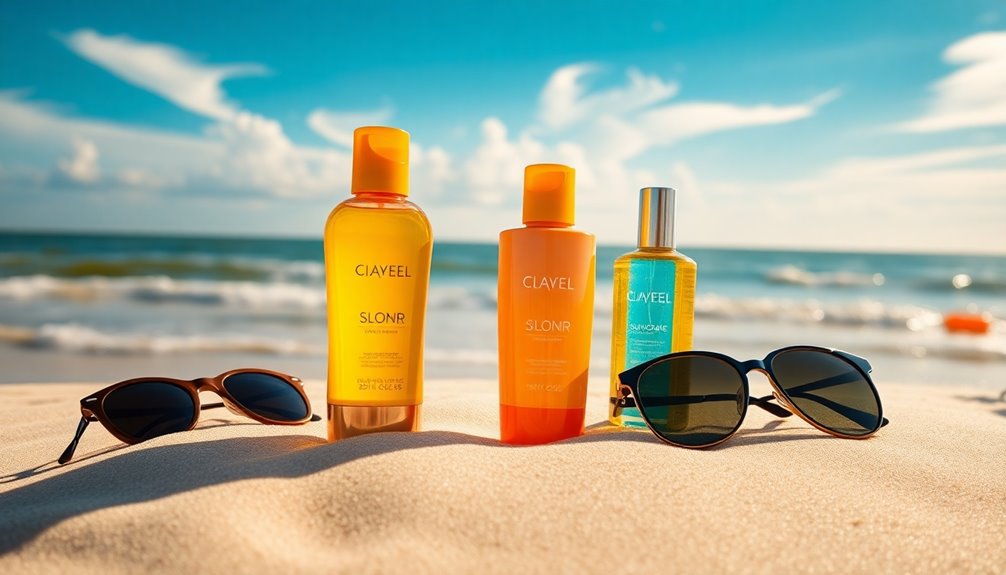
For 2024, the three best top-rated sunscreens you should try are Neutrogena Ultra Sheer Dry-Touch Sunscreen Lotion, Aveeno Protect + Hydrate Moisturizing Sunscreen, and Biore UV Aqua Rich Daily Moisturizer. Neutrogena offers SPF 70 with a quick-drying, matte finish. Aveeno's combination of SPF 60 and hydrating prebiotic oat is perfect for sensitive skin. Biore provides SPF 50 while keeping your complexion moisturized and looking fresh. All of these options absorb quickly and won't leave a greasy residue. Want to know how to pick the right one for your skin type? There's more to discover!
Key Takeaways
- Neutrogena Ultra Sheer Dry-Touch Sunscreen Lotion offers SPF 70, quick absorption, and matte finish, ideal for outdoor activities.
- Aveeno Protect + Hydrate Moisturizing Sunscreen provides SPF 60 with hydrating benefits and is suitable for sensitive skin.
- Biore UV Aqua Rich SPF 50 ensures effective protection while keeping skin moisturized with Hyaluronic Acid, perfect for daily use.
- Choose sunscreens with broad-spectrum protection and lightweight formulations for comfort and effective sun safety.
- Regular application of high-SPF sunscreens is crucial for reducing skin cancer risk and preventing premature aging.
Neutrogena Ultra Sheer Dry-Touch Sunscreen Lotion with SPF 70 (3 Fl Oz)
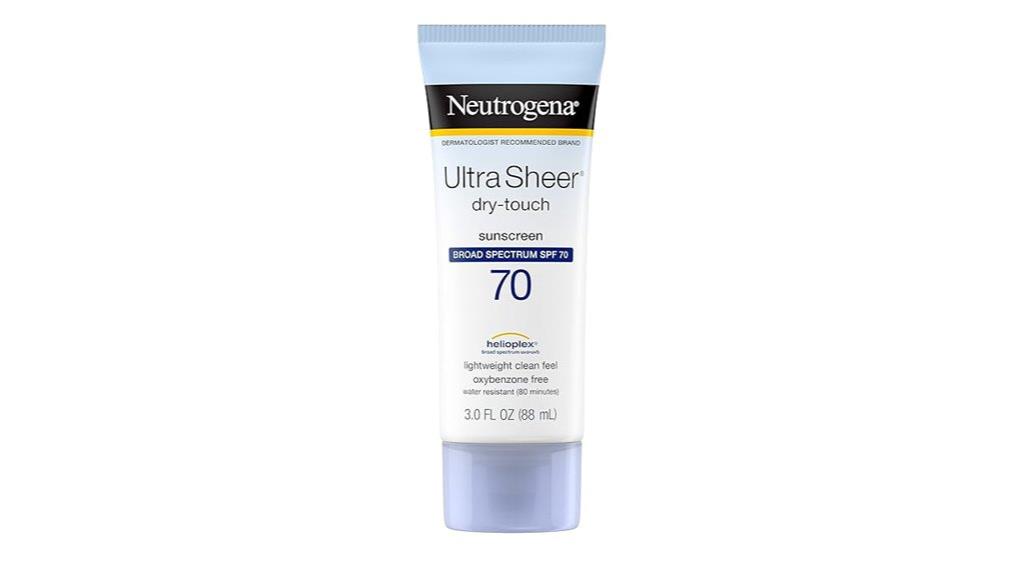
If you're seeking a lightweight, non-greasy sunscreen that offers high protection without the hassle of a heavy formula, Neutrogena Ultra Sheer Dry-Touch Sunscreen Lotion with SPF 70 is an excellent choice. This 3 Fl Oz lotion absorbs quickly and utilizes Dry-Touch technology, ensuring a comfortable, matte finish. With broad-spectrum UVA/UVB protection and Helioplex, you'll effectively defend your skin against sunburn and aging caused by harmful rays. It's water-resistant for up to 80 minutes, perfect for outdoor activities or a day at the pool. Plus, it's dermatologist-recommended, PABA-free, and non-comedogenic, making it suitable for both your face and body. Users rave about its quick absorption and lack of residue, making it a must-have for sun safety in 2024.
Best For: Individuals seeking high SPF protection in a lightweight, non-greasy formula suitable for everyday use and outdoor activities.
Pros:
- Broad-spectrum protection against UVA and UVB rays, helping prevent sunburn and skin aging.
- Quick-absorbing and non-greasy, providing a comfortable matte finish for use under makeup.
- Water-resistant for up to 80 minutes, making it ideal for swimming and sweating.
Cons:
- Requires reapplication every 80 minutes when swimming or sweating for continued protection.
- Higher SPF may not be necessary for everyone, leading to potential overuse.
- Travel size may not last long for frequent users or during extended outdoor activities.
Aveeno Protect + Hydrate Moisturizing Body Sunscreen Lotion with SPF 60
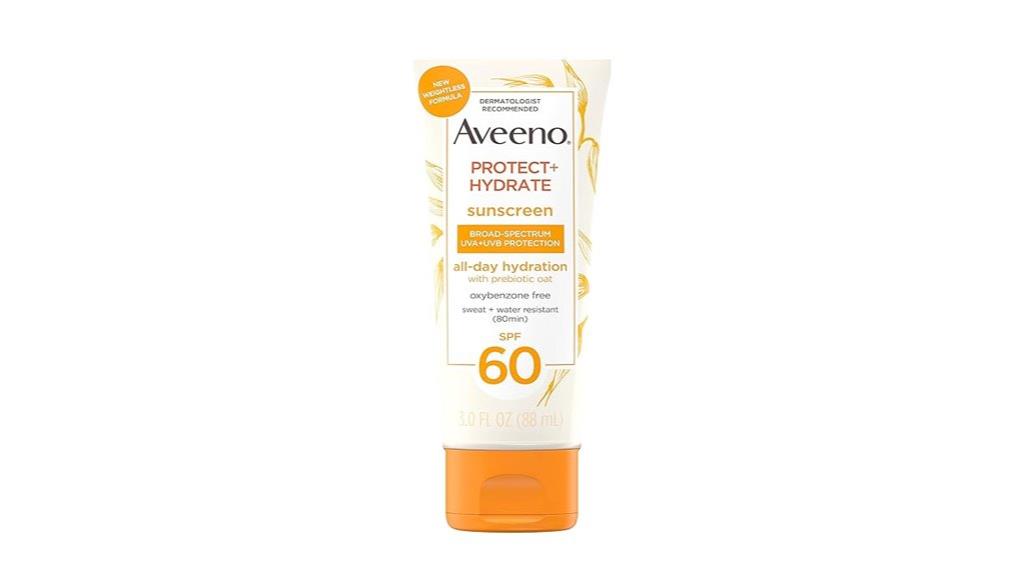
For those seeking a high-performance sunscreen that combines powerful protection with hydration, Aveeno Protect + Hydrate Moisturizing Body Sunscreen Lotion with SPF 60 is an excellent choice. This lightweight, non-greasy formula offers broad-spectrum protection and is infused with nourishing prebiotic oat, making it ideal for sensitive skin. Water and sweat-resistant for up to 80 minutes, it's perfect for outdoor activities. Users love how quickly it absorbs without leaving a white cast, though some note a shiny finish that might not suit makeup. Positive reviews highlight its moisturizing properties and pleasant scent. Just remember to keep it away from your eyes and lips to avoid irritation. Incorporate this sunscreen into your daily routine for effective, stylish skin protection.
Best For: Individuals with sensitive skin seeking a moisturizing and high-SPF sunscreen for daily use, including outdoor activities.
Pros:
- Lightweight and non-greasy formula that absorbs quickly.
- Water and sweat-resistant for up to 80 minutes, ideal for active individuals.
- Infused with nourishing prebiotic oat, providing hydration and soothing benefits.
Cons:
- Some users report a shiny finish that may not be suitable for makeup application.
- Higher price point may deter budget-conscious consumers.
- Caution needed to avoid contact with eyes and lips, which can cause irritation.
Biore UV Aqua Rich SPF 50 Daily Moisturizer Sunscreen for Sensitive Skin (3 Pack)
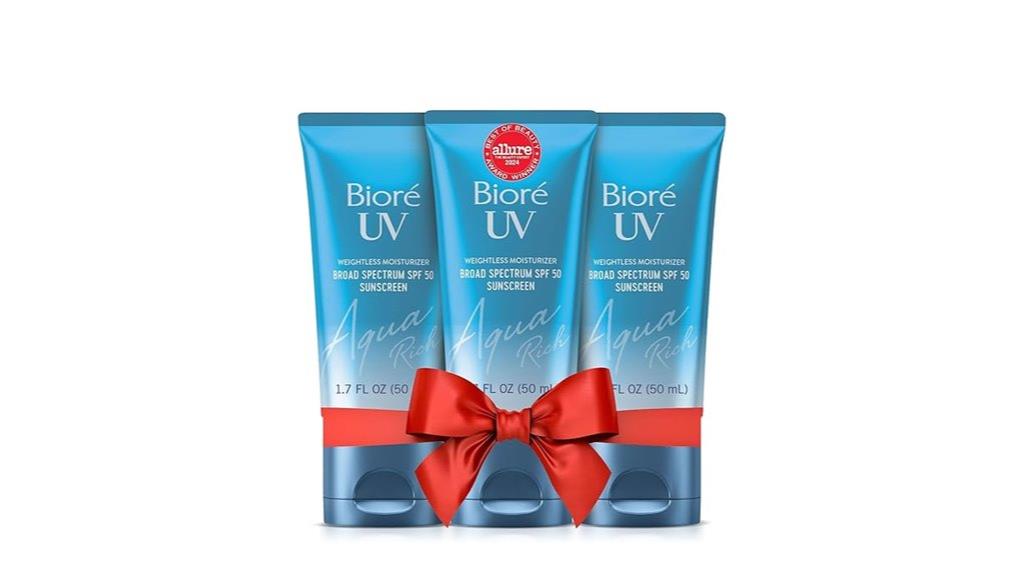
Biore UV Aqua Rich SPF 50 Daily Moisturizer Sunscreen is an exceptional choice for those with sensitive skin seeking effective sun protection without irritation. This award-winning formula features Hyaluronic Acid, ensuring eight hours of visible moisture while being oil-free and vegan. Its fast-absorbing texture leaves no white cast, making it suitable for all skin tones.
You'll appreciate the smooth application, as it works seamlessly under makeup without pilling or streaking. The lightweight feel and temporary pleasant citrus scent enhance your daily routine. While it's perfect for everyday use, remember it's not designed for prolonged sun exposure or swimming. For best results, apply it over a moisturizer if you have dry skin, ensuring your complexion stays hydrated and protected.
Best For: Individuals with sensitive skin seeking a lightweight, effective sunscreen that provides hydration without irritation.
Pros:
- Fast-absorbing formula that leaves no white cast, suitable for all skin tones.
- Contains Hyaluronic Acid for long-lasting moisture and is oil-free and vegan.
- Smooth application that works well under makeup without pilling or streaking.
Cons:
- Not suitable for prolonged sun exposure or swimming; a thicker mineral sunscreen is recommended for those activities.
- Some users report an initial white residue that disappears after drying.
- The temporary citrus scent may not be ideal for contact lens wearers.
Factors to Consider When Choosing Top-Rated Sunscreens for 2024
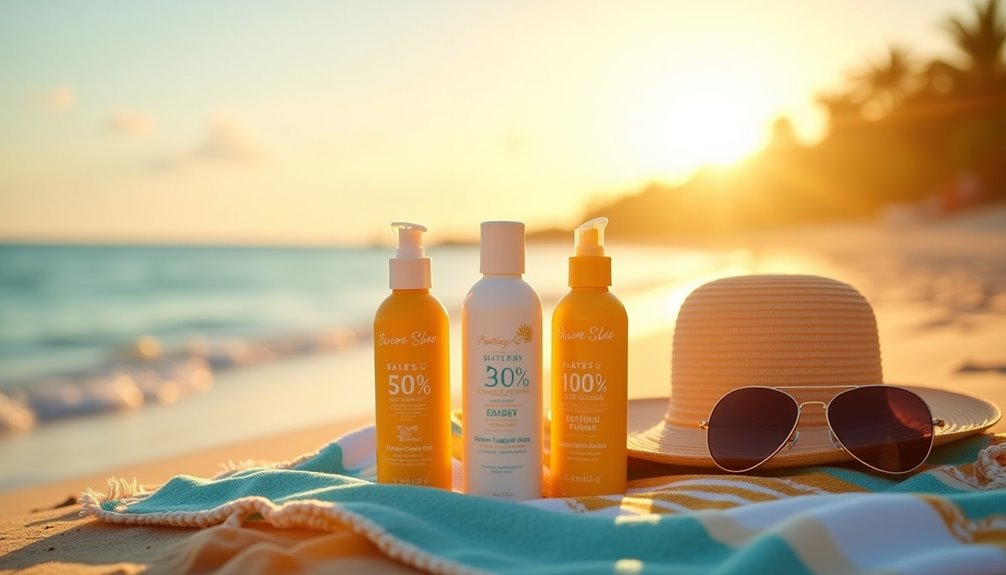
When choosing top-rated sunscreens for 2024, you should consider several key factors. Look for broad spectrum protection, guarantee it suits your skin type, and check for water resistance duration. Additionally, think about lightweight formulations and be mindful of ingredients you want to avoid.
Broad Spectrum Protection
Choosing a broad spectrum sunscreen is essential for protecting your skin from harmful UVA and UVB rays. UVA rays are responsible for skin aging, while UVB rays cause sunburn. To guarantee you're well-protected, look for sunscreens that are specifically labeled as broad spectrum. These products provide extensive coverage against the damaging effects of sun exposure.
When evaluating sunscreens, pay attention to the SPF rating, which measures UVB protection. A higher SPF indicates better defense against sunburn. Additionally, check the PA rating to understand the level of UVA protection offered. It's critical to select a sunscreen that meets both criteria for ideal skin safety.
Regular application of broad spectrum sunscreen is important, especially if you're spending time outdoors. Dermatologists recommend incorporating it into your daily skincare routine, as consistent use can notably reduce the risk of skin cancer and premature aging. This is particularly important for individuals with sensitive skin or those who engage in outdoor activities regularly.
Skin Type Suitability
Understanding your skin type is crucial for selecting the right sunscreen, especially in 2024 when products are increasingly tailored to individual needs. Different skin types—oily, dry, sensitive, or combination—require specific formulations. If you have oily skin, look for lightweight, oil-free formulas that won't add shine. For dry skin, opt for moisturizers with hydrating ingredients to keep your skin nourished.
If your skin is sensitive, hypoallergenic and fragrance-free sunscreens are a must to minimize irritation. Avoid common irritants like oxybenzone and parabens to protect your skin further. Those prone to acne should choose non-comedogenic options that won't clog pores, helping prevent breakouts while still offering sun protection.
For darker skin tones, you can often skip worrying about a white cast, but it's still crucial to prioritize broad-spectrum protection to combat UV damage effectively. Additionally, if you're undergoing treatments like chemotherapy, look for sunscreens with soothing ingredients and added hydration to maintain skin health during increased sensitivity. By considering your unique skin type, you can select a sunscreen that not only protects but also caters to your skin's specific needs.
Water Resistance Duration
Considering your outdoor activities, selecting a sunscreen with the right water resistance duration is vital for effective protection in 2024. Water-resistant sunscreens usually last for 40 to 80 minutes, whether you're swimming or sweating. To maintain ideal protection, you need to reapply your sunscreen after this time frame.
Keep in mind that the effectiveness of water-resistant formulas can diminish after swimming, towel drying, or heavy sweating. This means reapplying is essential to guarantee your skin stays protected from harmful UV rays. When shopping for sunscreen, look for products labeled as "water-resistant." This indicates they've been tested to withstand moisture, making them better suited for your active lifestyle.
Be sure to read product labels carefully, as not all sunscreens offer water resistance, and those that do can vary greatly in how long they last. If you know you'll be exposed to water or intense sweat for extended periods, consider choosing sunscreens specifically formulated for such conditions. These options typically provide enhanced durability and better protection, keeping your skin safe while you enjoy your favorite outdoor activities.
Lightweight Formulation Preference
After ensuring your sunscreen can withstand water exposure, the next factor to think about is the formulation. Lightweight formulations are often preferred because they absorb quickly into your skin, leaving a non-greasy feel that's comfortable for daily wear. You'll likely appreciate sunscreens that blend effortlessly without leaving a white cast, which is a common issue with heavier products.
Look for fast-absorbing ingredients, such as hyaluronic acid, which enhance moisture and contribute to an enjoyable user experience. This is especially important if you wear makeup, as lightweight options are typically suitable for all skin types and work well as a base.
If you're planning outdoor activities, lightweight sunscreens shine here too. They remain comfortable during sweating or water exposure, ensuring you don't feel weighed down or sticky. Ultimately, choosing a lightweight formulation can make your daily skincare routine smoother and more enjoyable, while also providing the protection your skin needs. So, when you're shopping for top-rated sunscreens for 2024, keep the lightweight factor in mind for a comfortable experience.
Ingredients to Avoid
When selecting a sunscreen for 2024, it's crucial to be aware of certain ingredients that can harm both your skin and the environment. First and foremost, avoid sunscreens containing oxybenzone. This ingredient has been linked to hormone disruption and can damage coral reefs, raising significant environmental concerns.
You should also steer clear of products with parabens. While these preservatives extend shelf life, they may contribute to skin irritation and potential endocrine disruption. If you have sensitive skin, look for formulations without synthetic fragrances, as these can trigger allergic reactions and irritation.
Additionally, refrain from using sunscreens that contain phthalates. These substances have raised health concerns due to potential reproductive toxicity. Finally, minimize the use of sunscreens with a high concentration of alcohol, which can lead to dryness and irritation, counteracting the intended moisturizing benefits.
Application Ease
Choosing a sunscreen that's easy to apply can make a significant difference in your daily routine. Look for products that absorb quickly and leave no white cast; this enhances your user experience and encourages regular application. Non-greasy formulas can provide a matte finish, making them perfect for wearing under makeup and ensuring you look your best throughout the day.
Fast-absorbing sunscreens are ideal as they allow for a smoother application without pilling or flaking, which is essential for makeup compatibility. Lightweight formulations with pleasant scents can also improve your overall experience, especially if you're sensitive to strong odors.
If you plan to spend time outdoors, opt for water-resistant options. These sunscreens maintain their effectiveness during sweating or swimming, but remember to apply them at least 15 minutes before sun exposure for best results. By considering these factors, you'll find a top-rated sunscreen that fits seamlessly into your lifestyle, ensuring your skin stays protected while making application a breeze.
Product Size Options
Product size options play an essential role in your sunscreen selection process, impacting both convenience and value. When choosing a sunscreen, think about how often you'll use it. If you're a daily user, larger sizes, like 8 fl oz or more, often provide better value, reducing the need for frequent purchases. It's a practical choice for those who apply sunscreen regularly.
On the other hand, if you're an occasional user, smaller sizes, usually around 3 fl oz, are ideal for travel and on-the-go application. They easily fit in your bag, making it simple to reapply throughout the day.
Additionally, consider multi-pack options. They allow you to stock up, ensuring you have enough sunscreen for outdoor activities without worrying about running out.
Integrating sunscreen into your daily routine can be smoother with the right size, especially for families or individuals applying it to multiple areas. By evaluating your frequency of use and lifestyle, you can select the perfect product size that meets your needs, making sun protection effortless and effective.
Frequently Asked Questions
Can I Use Sunscreen on My Face and Body Interchangeably?
You can use sunscreen on your face and body interchangeably, but it's best to choose products designed for each area. Facial sunscreens often have lighter formulas and added skincare benefits, while body sunscreens may be thicker and more water-resistant. If you're in a pinch, using body sunscreen on your face occasionally is fine, but be cautious of potential breakouts or irritation. Always check the ingredients to guarantee they're suitable for your skin type.
How Often Should I Reapply Sunscreen Throughout the Day?
They say, "An ounce of prevention is worth a pound of cure." To keep your skin protected, you should reapply sunscreen every two hours, especially if you're sweating or swimming. If you're outdoors for extended periods, consider applying it every hour. Don't forget to cover all exposed areas thoroughly, and use enough product to guarantee effective protection. Staying vigilant with reapplication helps you maintain that healthy glow while preventing sunburn and skin damage!
Are Mineral Sunscreens Better Than Chemical Sunscreens?
When deciding between mineral and chemical sunscreens, it really depends on your skin type and preferences. Mineral sunscreens sit on your skin and physically block UV rays, making them great for sensitive skin. On the other hand, chemical sunscreens absorb UV rays and often feel lighter. If you're concerned about irritation or prefer more natural ingredients, you might lean toward mineral options. Ultimately, both can effectively protect your skin if applied properly.
What Is the Difference Between SPF 30 and SPF 70?
SPF 30 and SPF 70 signify sun protection factor strength. Simply put, SPF 30 blocks about 97% of UVB rays, while SPF 70 blocks roughly 98.6%. The difference might seem slight, but if you're spending prolonged periods in the sun, that extra protection can be pivotal. Remember, no sunscreen's perfect, so reapply every two hours, regardless of the SPF. Your skin deserves diligent defense against harmful rays and premature aging!
Do Sunscreens Expire, and How Can I Tell?
Yes, sunscreens do expire, and it's important to check. Most products have an expiration date printed on the bottle. If you can't find one, it's wise to discard sunscreen after three years from purchase. Also, pay attention to changes in texture, color, or smell; these can indicate that the product has gone bad. Always use effective sunscreen to protect your skin from harmful UV rays and maintain its health.
Conclusion
In 2024, choosing the right sunscreen is essential for your skin's health. Did you know that nearly 1 in 5 Americans will develop skin cancer by the age of 70? That's a staggering statistic that highlights the importance of sun protection. With top-rated options like Neutrogena, Aveeno, and Biore, you can shield your skin stylishly and effectively. Don't take chances—make sun safety a priority this year, and enjoy the outdoors with confidence!





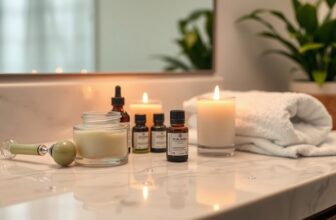

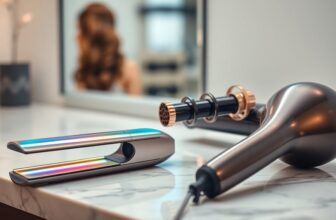
 Wishlist
Wishlist